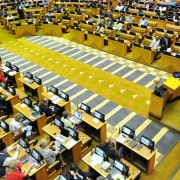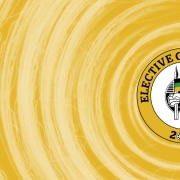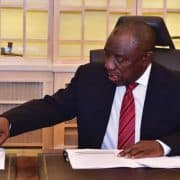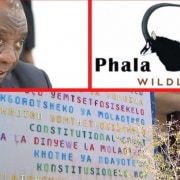|
Getting your Trinity Audio player ready...
|
Will President Cyril Ramaphosa step down in the wake of the findings of the Section 89 panel report that concluded on Wednesday that he may have violated the Constitution and committed serious misconduct in relation to Phala Phala?
Ramaphosa’s office in government – through Minister in the Presidency Mondli Gungubele – maintains that he is applying his mind to the report and will communicate his next move in due course, while the office of the president in the ANC says he must be given the opportunity to defend himself through the necessary legal means, as the panel’s narrow terms of reference alone cannot be counted on to declare him guilty.
“It’s absolutely concerning that we find ourselves in this moment, when we believed we had turned the corner on the era of state capture and much faith had been put in the executive to lead the fight against corruption,” commented Corruption Watch’s executive director Karam Singh.
A statement released on Wednesday afternoon by the Presidency notes: “The Presidency appreciates that according to the rules of the National Assembly, the NA needs to consider the report and determine the most appropriate way forward.
“The s89 process has presented an unprecedented and extraordinary moment for South Africa’s constitutional democracy. The conclusions of the panel require careful reading and appropriate consideration in the interest of the stability of government and that of the country.”
If indeed the National Assembly (NA) adopts the report, a process that requires political parties therein to vote, a process of impeachment will be the next logical course. NA speaker Nosiviwe Mapisa-Nqakula said on Wednesday the report would be considered by the NA on 6 December.
“While this story still must unfold, and the implications could be an impeachment or resignation or even possibly some kind of exoneration,” added Singh, “it does raise serious questions about the conduct of our leadership, their involvement in private sector interests, their involvement in business which involves the transfer of large sums of cash and the potential cover up of this matter.”
Phala Phala mystery not yet resolved
Meanwhile, there are conflicting media reports on whether a special ANC NEC meeting called for Thursday evening, is in response to the latest developments. NEC member and deputy minister of state security Zizi Kodwa says the meeting was scheduled even before the latest news from the panel, but reiterated in a TV interview that the party takes the matter seriously.
Ramaphosa has faced a lot of backlash since June this year when former the former national commissioner for the Department of Correctional Services Arthur Fraser released information publicly that related to an alleged robbery of about US$580 000 (about R10-million) at the Phala Phala Game Farm in Limpopo in February 2020, owned by Ramaphosa. Fraser claimed that the incident, which happened in 2020, had all the markings of a money laundering scheme that the president should answer for.
Opposition party ATM then submitted to Parliament a motion in terms of Section 89 of the Constitution that allows the NA to remove a sitting president should there be a serious violation of the Constitution.
Ramaphosa has repeatedly denied any wrongdoing in the wake of calls for him to account, claiming that the money was proceeds from the sale of game, a part of the purpose of Phala Phala.
Politically, the matter has played out dramatically with several leaders in Ramaphosa’s party calling for his head in the lead-up to the ANC’s national elective conference in a couple of weeks. Opposition parties have also reacted strongly to the findings of the panel, calling for Ramaphosa to do the right thing, and resign.
Considerations of impeachment
The three-member Section 89 panel is headed by former Chief Justice Sandile Ngcobo, and also includes Judge Thokozile Masipa and Senior Counsel Mahlape Sello. It was established in September and given 30 days in which to determine if the allegations are cause for an impeachment process.
In the report, the panel notes: “The power of impeachment is an important check on the executive branch of government. Impeachment and removal from office represent the ultimate sanction that the People can impose on a Head of State. The authority to impeach and remove the President from office exists essentially to protect our constitutional democracy from behaviour that endangers our Constitution and the rule of law.
“The authority to impeach is deeply rooted in the principle of accountability. This principle is one of our foundational values and is given effect to, in the text of the Constitution. The impeachment and removal from office process is an important tool for holding the President to account. The importance of this process is underscored by the protection given to members of Parliament to ensure that they are not subject to outside influence.”








